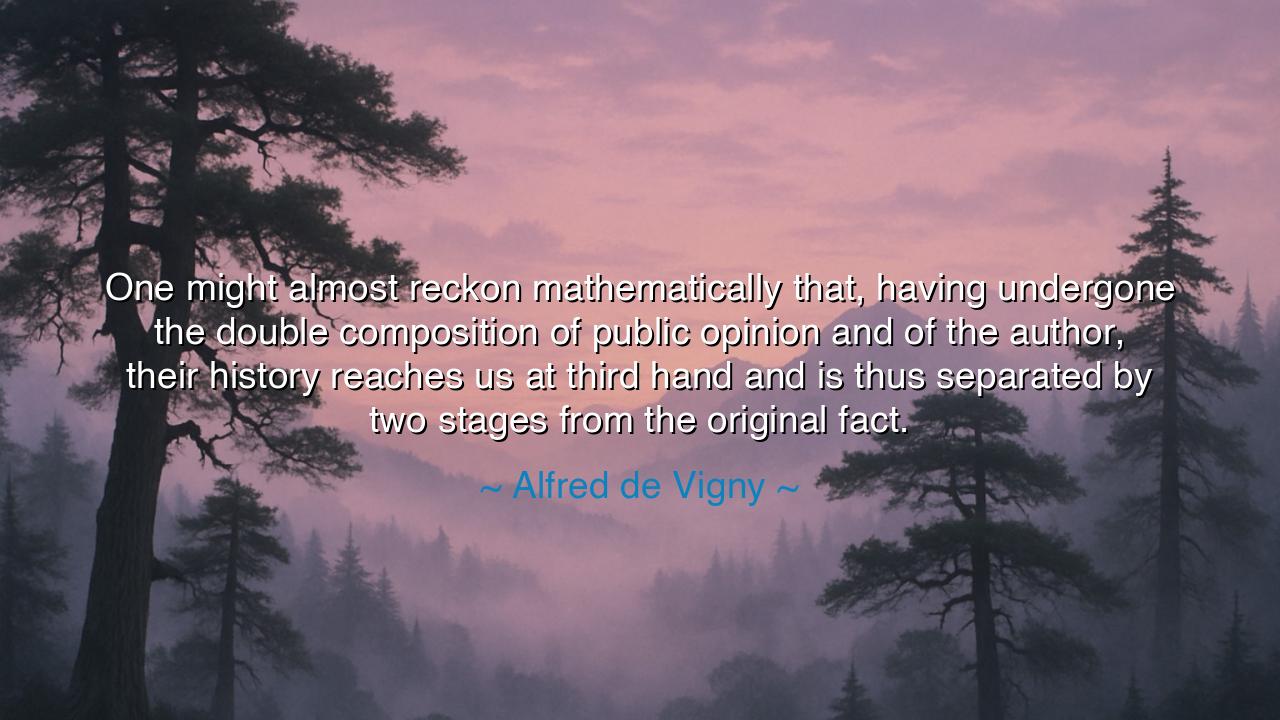
One might almost reckon mathematically that, having undergone the
One might almost reckon mathematically that, having undergone the double composition of public opinion and of the author, their history reaches us at third hand and is thus separated by two stages from the original fact.






In the contemplative voice of the poet and philosopher, Alfred de Vigny, a man who stood at the crossroads of literature and truth, we hear these immortal words: “One might almost reckon mathematically that, having undergone the double composition of public opinion and of the author, their history reaches us at third hand and is thus separated by two stages from the original fact.” At first, the phrase seems the reflection of a scholar weary of distortion — yet beneath its calm reasoning lies a thunderous truth: that history, as we know it, is never pure. What we call “truth” is often but an echo, passed through the mouths and minds of others, shaped by opinion, interpretation, and time. Vigny warns us not in cynicism, but in wisdom — for only through awareness of distortion can we approach the light of understanding.
When Vigny speaks of “the double composition of public opinion and of the author,” he is describing the twin filters through which all events must pass before reaching us. First, the crowd — that vast and shifting ocean of perception — shapes how an event is seen. The people, in their passions, fears, and desires, create the first veil over reality. Then, the author, whether historian, poet, or chronicler, takes this collective vision and gives it form, word, and meaning — imposing his own heart and mind upon it. Thus, what was once a fact, simple and unvarnished, becomes clothed in the garments of interpretation. By the time it reaches us, it is no longer the thing itself, but its reflection in mirrors, each bent by the temperament of those who looked upon it.
The origin of these words lies in Vigny’s meditations on truth and art during the 19th century, a time when France was still reckoning with revolutions and wars that had rewritten its soul. A soldier turned poet, Vigny had seen both the battlefield and the library; he had witnessed the distance between what happens and what is remembered. His age was one of chroniclers and historians eager to immortalize their causes. Yet Vigny, ever the stoic observer, recognized that even the most honest writer could not escape the burden of perspective. Thus, his warning is timeless: that truth, once told, becomes story, and story, however noble, is not the same as reality.
Consider the example of the fall of Troy, one of humanity’s most enduring tales. The war itself may have been fought by men, but its memory was sung by Homer, and from his song we know the Iliad — not the event, but its poetic shadow. The fire that consumed the city was real, but the gods who walked upon the walls were born of imagination. The warriors lived and died, yet their souls were reshaped by centuries of retelling, until Achilles, Hector, and Helen became symbols rather than people. This is what Vigny means by “third hand” history — what began as life becomes myth through the hands of opinion and art. And yet, though it is removed from the original fact, it carries a truth deeper than mere detail — the truth of human nature itself.
This is the paradox Vigny invites us to face: that truth and illusion intertwine in the telling of history. We crave certainty, yet our understanding is always bound by language, emotion, and the collective mind of our age. Every generation rewrites the past in its own image — what the ancients called “fate,” we call “bias.” But Vigny does not counsel despair. Rather, he urges vigilance. To know that our understanding is limited is to be wise; to question what we are told is to be free. The danger lies not in the distortions of history, but in those who mistake such shadows for the sun itself.
The lesson is this: seek truth, but with humility. Approach every story — whether in books, in politics, or in the memories of your people — as a sacred puzzle, where fragments of light lie hidden within layers of interpretation. Read not only what is written, but what is unsaid. Ask: whose eyes witnessed this? Whose voice tells it now? What do they gain, and what might they conceal? For though truth may reach us “at third hand,” as Vigny says, those who search with discernment can still find its essence, like a flame preserved beneath the ashes of centuries.
And so, O listener of time, take Vigny’s wisdom as both warning and guide. Do not surrender your judgment to the multitude, nor believe that even the wisest author can show you the whole of reality. Instead, learn to hold doubt as a form of reverence — not doubt that destroys, but doubt that refines. Let history be your teacher, but not your master. For the truth that lives in the hearts of men is never lost, only veiled. And it is the work of the thoughtful — the seekers, the philosophers, the poets — to lift that veil, layer by layer, until the faint glimmer of the original fact shines through once more.
Thus, in the words of Alfred de Vigny, we find not disillusionment, but enlightenment: a call to honor both fact and fiction, yet to mistake neither for the whole. History may reach us through the imperfect vessels of opinion and art, but it is through those very vessels that humanity learns to remember, to dream, and to seek truth anew — generation after generation, hand to hand, heart to heart.






AAdministratorAdministrator
Welcome, honored guests. Please leave a comment, we will respond soon